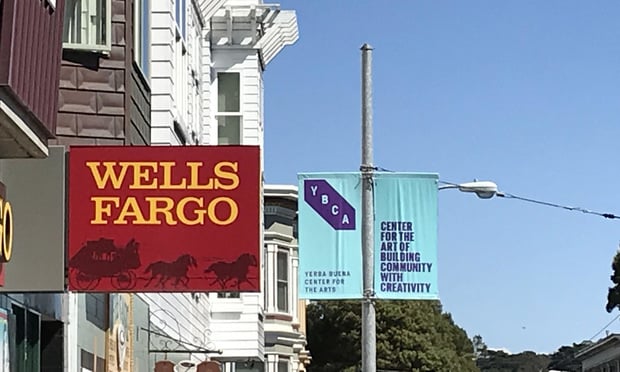Meet the California Whistleblower Lawyer Helping Cities Sue Wells Fargo
Public-private litigation partnerships are "becoming more and more customary when it comes to claims that require a speciality that the counties or the cities don't have, necessarily. It seems like it's kind of a growing area,” San Francisco-based whistleblower lawyer Yosef Peretz says.
March 06, 2018 at 05:16 PM
5 minute read
 Wells Fargo branch in San Francisco. Credit: Mike Scarcella/ ALM
Wells Fargo branch in San Francisco. Credit: Mike Scarcella/ ALM When Sacramento joined the ranks of cities suing Wells Fargo & Co. over allegations of discriminatory mortgage lending practices, it turned last month to a lawyer at a small firm in San Francisco who has become a familiar foe for the bank.
Yosef Peretz, of Peretz & Associates, first sued Wells Fargo in 2010 in the U.S. District Court for the Northern District of California, where he represented a fired employee who accused the bank of opening accounts without customers' permission—the same conduct that would arise six years later in the bank's $185 million settlement with federal regulators and the Los Angeles City Attorney's Office.
In the years since, Peretz has been hired by Miami Gardens, Florida, and Oakland to participate in the lawsuits those cities brought against Wells Fargo, accused of saddling minority borrowers with loans that were costlier than those offered to similarly situated white borrowers.
“I have a lot of experience with Wells Fargo. It helps,” Peretz said in an interview this week.
 Yosef Peretz.
Yosef Peretz.Peretz wouldn't comment about his arrangement with Sacramento on its suit, filed on Feb. 23 in the U.S. District Court for the Eastern District of California.
A Wells Fargo spokesman said the cities' lawsuits are based on a “concept being marketed by the same group of plaintiffs' attorneys at no cost to the cities.” Los Angeles brought a similar mortgage discrimination case in 2013, which a federal judge dismissed in 2015—a decision that was later upheld by the U.S. Court of Appeals for the Ninth Circuit.
“The cities' accusations against Wells Fargo do not reflect how we operate in the communities we serve, and we will vigorously defend our long-standing record of fair and responsible lending,” Wells Fargo said in a statement. “We deeply value our community relationships, and are working diligently and consistently with customers, credit counselors, nonprofit organizations and government agencies to expand homeownership opportunities and revitalize distressed neighborhoods.”
Companies routinely complain about partnerships cities and states form with plaintiffs lawyers for investigations and litigation. The chief argument from industry is that state and local governments should be barred from outsourcing public investigations.
On Monday, the U.S. Supreme Court declined to take up Endo Pharmaceuticals Inc.'s challenge to the contract New Hampshire signed with Cohen Milstein Sellers & Toll for an opioid investigation. Endo's lawyers at Arnold & Porter urged the court to “change the face of modern enforcement proceedings by taking profit motive out of the process.” The contract has since been transferred to Motley Rice.
Cohen Milstein is working with Peretz in a suit the city of Oakland filed against Wells Fargo in 2015. Additionally, lawyers from the Center for Constitutional Litigation and Torrance-based Trial & Appellate Resources are involved in the Oakland case, and in the Sacramento case. Matthew Ruyak, an assistant city attorney for Sacramento, was on the city's complaint.
Philadelphia, which sued Wells Fargo last May, hired several plaintiffs firms—including Lieff Cabraser Heimann & Bernstein; Berger & Montague; and Schonbrun Seplow Harris & Hoffman.
For the Philadelphia case, Wells Fargo hired a defense team headlined by Hogan Lovells partner Neal Katyal, who has spearheaded the legal challenges to the Trump administration's travel ban. Also on the defense team are lawyers from Duane Morris and K&L Gates.
Last month, U.S. District Judge Anita B. Brody of the Eastern District of Pennsylvania denied Wells Fargo's motion to dismiss the lawsuit.
Wells Fargo has yet to reveal its defense lawyers in the Sacramento case. The bank has hired Munger, Tolles & Olson and Proskauer Rose to defend it against Oakland in the U.S. District Court for the Northern District of California.
Peretz's client engagements against Wells Fargo are not limited to federal trial courts.
Recently, Peretz represented a former Wells Fargo branch manager who claimed she was fired for blowing the whistle on colleagues who had been opening unauthorized accounts. After the U.S. Department of Labor ordered Wells Fargo to reinstate his client, Claudia Ponce de Leon, and pay her $577,500 in back wages, damages and legal fees, Peretz negotiated a confidential settlement with the bank.
Whether over discriminatory mortgage lending or retaliation against whistleblowers, Peretz said, his cases against Wells Fargo involve “the same types of issues: workers on the branch side, whether those are bankers or mortgage officers, were incentivized to act unlawfully because they wanted to earn commissions.”
Peretz said public-private litigation relationships are “becoming more and more customary when it comes to claims that require a speciality that the counties or the cities don't have, necessarily. It seems like it's kind of a growing area.”
This content has been archived. It is available through our partners, LexisNexis® and Bloomberg Law.
To view this content, please continue to their sites.
Not a Lexis Subscriber?
Subscribe Now
Not a Bloomberg Law Subscriber?
Subscribe Now
NOT FOR REPRINT
© 2025 ALM Global, LLC, All Rights Reserved. Request academic re-use from www.copyright.com. All other uses, submit a request to [email protected]. For more information visit Asset & Logo Licensing.
You Might Like
View All
Buchalter Hires Longtime Sheppard Mullin Real Estate Partner as Practice Chair

Reality TV Couple and Pacific Palisades Neighbors Sue City of Los Angeles Over Loss of Homes to Fire
3 minute read
In Resolved Lawsuit, Jim Walden Alleged 'Retaliatory' Silencing by X of His Personal Social Media Account

No Two Wildfires Alike: Lawyers Take Different Legal Strategies in California
5 minute readTrending Stories
- 1Some Thoughts on What It Takes to Connect With Millennial Jurors
- 2Artificial Wisdom or Automated Folly? Practical Considerations for Arbitration Practitioners to Address the AI Conundrum
- 3The New Global M&A Kings All Have Something in Common
- 4Big Law Aims to Make DEI Less Divisive in Trump's Second Term
- 5Public Notices/Calendars
Who Got The Work
J. Brugh Lower of Gibbons has entered an appearance for industrial equipment supplier Devco Corporation in a pending trademark infringement lawsuit. The suit, accusing the defendant of selling knock-off Graco products, was filed Dec. 18 in New Jersey District Court by Rivkin Radler on behalf of Graco Inc. and Graco Minnesota. The case, assigned to U.S. District Judge Zahid N. Quraishi, is 3:24-cv-11294, Graco Inc. et al v. Devco Corporation.
Who Got The Work
Rebecca Maller-Stein and Kent A. Yalowitz of Arnold & Porter Kaye Scholer have entered their appearances for Hanaco Venture Capital and its executives, Lior Prosor and David Frankel, in a pending securities lawsuit. The action, filed on Dec. 24 in New York Southern District Court by Zell, Aron & Co. on behalf of Goldeneye Advisors, accuses the defendants of negligently and fraudulently managing the plaintiff's $1 million investment. The case, assigned to U.S. District Judge Vernon S. Broderick, is 1:24-cv-09918, Goldeneye Advisors, LLC v. Hanaco Venture Capital, Ltd. et al.
Who Got The Work
Attorneys from A&O Shearman has stepped in as defense counsel for Toronto-Dominion Bank and other defendants in a pending securities class action. The suit, filed Dec. 11 in New York Southern District Court by Bleichmar Fonti & Auld, accuses the defendants of concealing the bank's 'pervasive' deficiencies in regards to its compliance with the Bank Secrecy Act and the quality of its anti-money laundering controls. The case, assigned to U.S. District Judge Arun Subramanian, is 1:24-cv-09445, Gonzalez v. The Toronto-Dominion Bank et al.
Who Got The Work
Crown Castle International, a Pennsylvania company providing shared communications infrastructure, has turned to Luke D. Wolf of Gordon Rees Scully Mansukhani to fend off a pending breach-of-contract lawsuit. The court action, filed Nov. 25 in Michigan Eastern District Court by Hooper Hathaway PC on behalf of The Town Residences LLC, accuses Crown Castle of failing to transfer approximately $30,000 in utility payments from T-Mobile in breach of a roof-top lease and assignment agreement. The case, assigned to U.S. District Judge Susan K. Declercq, is 2:24-cv-13131, The Town Residences LLC v. T-Mobile US, Inc. et al.
Who Got The Work
Wilfred P. Coronato and Daniel M. Schwartz of McCarter & English have stepped in as defense counsel to Electrolux Home Products Inc. in a pending product liability lawsuit. The court action, filed Nov. 26 in New York Eastern District Court by Poulos Lopiccolo PC and Nagel Rice LLP on behalf of David Stern, alleges that the defendant's refrigerators’ drawers and shelving repeatedly break and fall apart within months after purchase. The case, assigned to U.S. District Judge Joan M. Azrack, is 2:24-cv-08204, Stern v. Electrolux Home Products, Inc.
Featured Firms
Law Offices of Gary Martin Hays & Associates, P.C.
(470) 294-1674
Law Offices of Mark E. Salomone
(857) 444-6468
Smith & Hassler
(713) 739-1250






